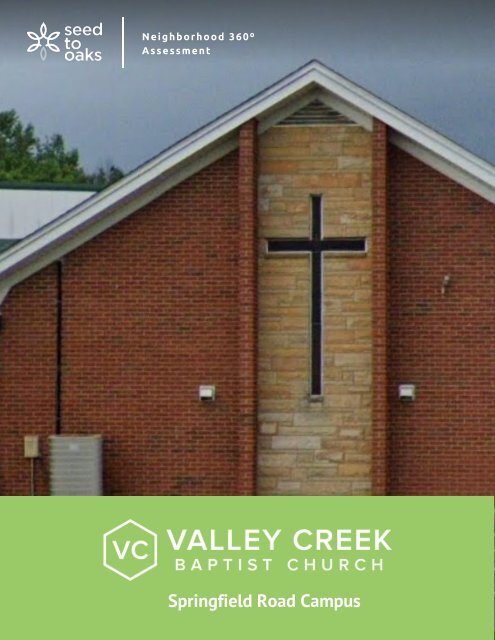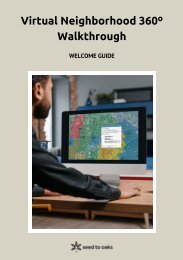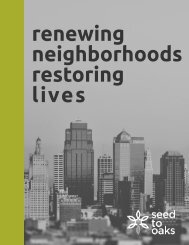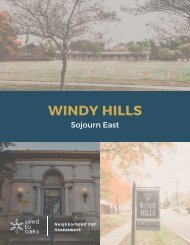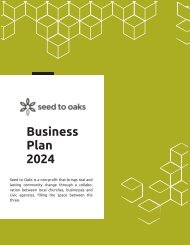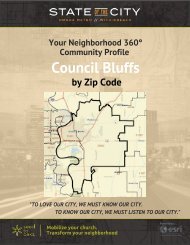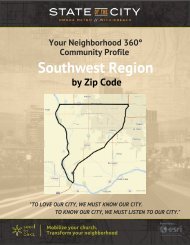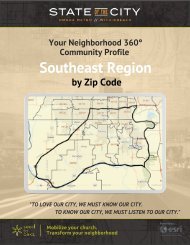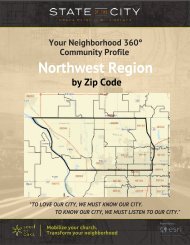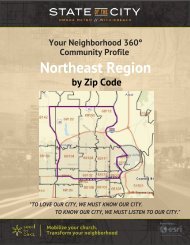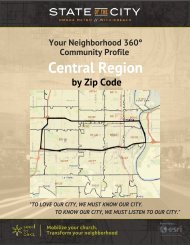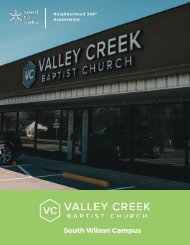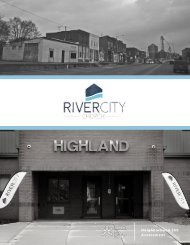Valley Creek Baptist Church Springfield Rd
Neighborhood 360 Assessment for Valley Creek Baptist Church Springfield Road campus.
Neighborhood 360 Assessment for Valley Creek Baptist Church Springfield Road campus.
- No tags were found...
Create successful ePaper yourself
Turn your PDF publications into a flip-book with our unique Google optimized e-Paper software.
Neighborhood 360º<br />
Assessment<br />
<strong>Springfield</strong> Road Campus
WELCOME TO YOUR<br />
NEIGHBORHOOD 360º ASSESSMENT<br />
Introduction<br />
Neighborhood Snapshot<br />
History of <strong>Valley</strong> <strong>Creek</strong> <strong>Baptist</strong><br />
History of Elizabethtown<br />
Local Insights<br />
Demographics<br />
Neighborhood Observations<br />
Survey Results<br />
Neighborhood Wants, Dreams, and Desires<br />
<strong>Church</strong> Survey Results<br />
Opportunities for Ministry<br />
Reflective Questions<br />
2<br />
<br />
3<br />
<br />
3<br />
<br />
4<br />
<br />
5<br />
<br />
6<br />
<br />
7<br />
<br />
8<br />
<br />
10<br />
<br />
12<br />
<br />
13<br />
<br />
14
INTRODUCTION<br />
<strong>Valley</strong> <strong>Creek</strong> <strong>Baptist</strong> <strong>Church</strong> is a mission driven<br />
church who exists to grow the kingdom of God<br />
and build up new and young disciples for<br />
Christ. We believe that the world is our<br />
mission field and strive to live everyday with<br />
that as a driving force of everything we do.<br />
Inside the church, we work to make disciples<br />
who are readily equipped to share the gospel<br />
and are comfortable doing so in any situation.<br />
To better understand Elizabethtown and the<br />
current barriers and bridges that exist, we<br />
commissioned a team of volunteers to conduct<br />
an in-depth neighborhood study of the<br />
neighborhoods surrounding <strong>Valley</strong> <strong>Creek</strong><br />
<strong>Baptist</strong> <strong>Church</strong>. Our goal was to become<br />
students of Elizabethtown in order to become<br />
servants of the community. We surveyed<br />
neighbors door-to-door, conducted in-depth<br />
interviews, spent hours walking to observe our<br />
streets, and collected demographic, historical<br />
and cultural data to complete this study.<br />
This neighborhood study is intended to aid<br />
you, your ministry team, your Life Groups, and<br />
our church body to:<br />
Build connections between <strong>Valley</strong> <strong>Creek</strong><br />
<strong>Baptist</strong> <strong>Church</strong> and the community<br />
Guide strategic planning and the development<br />
of new ministries<br />
Draw on stories of motivation and vision in<br />
the community<br />
Understand the forces that affect the lives of<br />
people in the community<br />
Understand the community factors that will<br />
influence ministry effectiveness<br />
Understand how we as a church are affected<br />
by the community<br />
Discern how <strong>Valley</strong> <strong>Creek</strong> <strong>Baptist</strong> <strong>Church</strong> is<br />
perceived by the community<br />
Engage our neighbors through creative,<br />
effective, and wise relationships<br />
At the end of this booklet, you will find a<br />
series of discussion questions. Our goal is not<br />
to prescribe ministry opportunities to all of<br />
our members and Life Groups but to provide<br />
this study as a means of stimulating creative<br />
thinking. So, once you’ve read through this<br />
study, gather a few friends and discuss how<br />
your group or ministry can wisely and<br />
effectively engage the people of<br />
Elizabethtown.<br />
We are excited to see what God will do<br />
through our presence in Elizabethtown!<br />
2
NEIGHBORHOOD SNAPSHOT<br />
<strong>Valley</strong> <strong>Creek</strong> <strong>Baptist</strong> is located on <strong>Springfield</strong> Road<br />
at the intersection of <strong>Valley</strong> <strong>Creek</strong> Road and<br />
<strong>Springfield</strong> Road. The area of the study primarily<br />
included <strong>Valley</strong> <strong>Creek</strong> Road, <strong>Springfield</strong> Road,<br />
Middle <strong>Creek</strong> Road, Miller Road, Ford Highway, Red<br />
Mill Road, Youngers <strong>Creek</strong> Road from Miller Road to<br />
Highway 62, and Hodgenville Road from <strong>Valley</strong><br />
<strong>Creek</strong> to Red Mill Road.<br />
<strong>Springfield</strong> <strong>Rd</strong><br />
Miller <strong>Rd</strong><br />
<strong>Valley</strong> <strong>Creek</strong> <strong>Rd</strong><br />
HISTORY OF VALLEY<br />
CREEK BAPTIST<br />
The church began in August of 1872 when members<br />
from several other area churches came together to<br />
form a congregation closer to home in the <strong>Valley</strong><br />
<strong>Creek</strong> community. The building all started as a<br />
simple white frame structure, heated by a wood<br />
stove and lit by oil lamps. A new church building<br />
was dedicated in April of 1971, with more rooms for<br />
Life Groups added in 1987. As God continued to<br />
bless the worship attendance of the church, a new<br />
worship center was built in 1995, followed by a new<br />
Family Life Center in February of 2001. The South<br />
Wilson Campus was launched in 2020 as the church<br />
continued to grow.<br />
3
HISTORY OF ELIZABETHTOWN<br />
Elizabethtown, Kentucky is a city in Hardin County, situated in the central part of the state. It was<br />
established in 1793 and named after Elizabeth Hynes, the wife of Colonel Andrew Hynes, who was a<br />
settler in the area. The land where Elizabethtown was founded was originally part of a large parcel of<br />
land granted by the state of Virginia to the Marquis de Lafayette in recognition of his service during the<br />
American Revolution.<br />
In the early days of Elizabethtown, it was a small trading center for local farmers, and the town grew<br />
slowly. However, the establishment of a post office in 1800 helped to increase its importance as a<br />
commercial hub. The town's location on the Louisville and Nashville Turnpike also made it an<br />
important stop for travelers heading west.<br />
During the Civil War, Elizabethtown played a strategic role due to its location on the major roads<br />
leading to both Nashville and Louisville. In 1862, Confederate General Braxton Bragg and his troops<br />
occupied the city for a short time, using it as a base of operations during their invasion of Kentucky.<br />
Union troops eventually retook the city, and it was not until the end of the war that the town fully<br />
recovered.<br />
Throughout the 20th century, Elizabethtown continued to grow and prosper. The establishment of Fort<br />
Knox, a large military base nearby, brought many jobs to the area and helped to spur development.<br />
Today, Elizabethtown is a thriving community. Its location along Interstate 65 makes it a popular stop<br />
for travelers, and the city is home to a number of businesses and industries, including healthcare,<br />
manufacturing, and education. There are also many cultural and recreational opportunities in the area,<br />
including the summer concert series at Freeman Lake Park, organized sports, and the Heartland<br />
Festival. The City Seal, with the inscription "Elizabethtown, Strong and Growing Since 1779" still rings<br />
true today.<br />
4
LOCAL INSIGHTS<br />
Elizabethtown has something to offer for everyone, whether you are doing business, visiting or living<br />
here. While the City of Elizabethtown has an official population of over 30,000 residents, we<br />
discovered that the average daytime population doubles due to the regional attraction as a place to<br />
work, shop, dine and entertain. It’s a great place to live. Elizabethtown is a diverse community with<br />
annual festivals, award-winning schools and a thriving historic downtown.<br />
Situated at the crossroads of major highways including Interstate 65, Elizabethtown is conveniently<br />
within a day’s drive of two-thirds of the U.S. population. For those traveling by air, the community is<br />
easily accessible through the local general aviation airport, Elizabethtown Regional<br />
Airport/Addington Field or commercial flights at nearby Louisville International Airport.<br />
5
DEMOGRAPHICS<br />
POPULATION HIGHLIGHTS<br />
Total Population: 31,298<br />
Total Households: 13,296<br />
AGE<br />
65+: 12%<br />
40-64: 33%<br />
22-39: 24%<br />
18-21: 5%<br />
0-17: 25%<br />
RACE<br />
White 25,038 (80.4%)<br />
Black: 3,393 (11.2%)<br />
Asian: 757 (2.5%)<br />
Hispanic: 1,665 (5.5%)<br />
Other: 123 (0.4%)<br />
GENDER<br />
Female: 50.6%<br />
Male: 49.4%<br />
EDUCATION<br />
Higher Degree: 28.7%<br />
High School: 91.3%<br />
MEDIAN HOUSEHOLD INCOME<br />
Elizabethtown: $57,163<br />
Kentucky: $52,295<br />
EMPLOYMENT<br />
Employed: 54.9%<br />
Unemployed: 4.7%<br />
Not in the Labor Force: 36%<br />
MARITAL STATUS<br />
Never Married: males 30%, females 22%<br />
Married: males 54%, females 52%<br />
Separated/Divorced: males 14%, females 17%<br />
Widowed: males 2%, females 9%<br />
FAMILY HOUSEHOLD TYPE<br />
Percentage of family households with children under the age of 18.<br />
Married: 52.4%<br />
Single Moms: 12%<br />
Single Dads: 4.9%<br />
NOTABLE FEATURES<br />
Here are some insights about how<br />
Elizabethtown compares to the Kentucky<br />
state average:<br />
Unemployment percentage<br />
significantly below state average.<br />
Black race population percentage<br />
above state average.<br />
Hispanic race population percentage<br />
above state average.<br />
Median age below state average.<br />
Renting percentage above state<br />
average.<br />
Length of stay since moving below<br />
state average.<br />
Institutionalized population<br />
percentage above state average.<br />
Percentage of population with a<br />
bachelor's degree or higher above<br />
state average.<br />
6
NEIGHBORHOOD OBSERVATIONS<br />
The Elizabethtown lifestyle features country living and selfreliance.<br />
Avid do-it-yourselfers, they maintain and remodel<br />
their homes with all the necessary power tools to accomplish<br />
the jobs. Gardening, especially growing vegetables, is a<br />
priority, again with the right tools, tillers, tractors, and riding<br />
mowers. Outdoor living features a variety of sports: hunting<br />
and fishing, motorcycling, hiking and camping, and even golf.<br />
The neighborhoods have mostly transformed from the easy<br />
pace of country living to semi rural subdivisions in the last<br />
few decades, as the housing boom spread beyond large<br />
metropolitan cities, like Louisville. We noticed that many<br />
residents are financially thrifty but willing to carry some debt<br />
and are already investing in their futures. They rely on their<br />
smartphones and mobile devices to stay in touch and pride<br />
themselves on their expertise. The people we met prefer to<br />
buy American and travel in the US.<br />
We did some research as well as talking and surveying the<br />
community and began to notice some of the following<br />
themes about the residents who live here.<br />
Residents are partial to domestic vehicles; they like to<br />
drive trucks, SUVs, or motorcycles.<br />
Entertainment is primarily family oriented, TV and movie<br />
rentals or theme parks and family restaurants.<br />
Spending priorities also focus on family (children’s toys<br />
and apparel) or home DIY projects.<br />
Sports include hunting, fishing, bowling, and basketball.<br />
TV and magazines are a primary source of entertainment<br />
and information. And Media preferences include country<br />
and Christian channels.<br />
7
SURVEY RESULTS<br />
Over 100 interviews were conducted in Elizabethtown. We went door to door and asked the following<br />
questions.<br />
How long have you lived in this community? What makes this a good place to live? (To give clues to<br />
where God is already at work in the community)<br />
What do you like best about this community? What makes this a good place to live? (To give clues to what<br />
are the greatest felt needs)<br />
What are one or two changes you would like to see that could make life better in this community? (To help<br />
discern what can be done to meet those needs)<br />
Do you have any ideas about ways a caring church could make a difference in this neighborhood? (To give<br />
clues to presently acceptable pathways for service)<br />
When asked what makes this a good place to live the answers we received were: it’s peaceful, they<br />
feel safe, the country setting, and privacy. Upon reflection, here are likely explanations for why we<br />
believe residents answered in this way:<br />
Residents desire a sense of safety and security: A peaceful neighborhood is often associated with<br />
a low crime rate and a general sense of safety and security. People tend to feel more comfortable<br />
and at ease when they know that their homes and their community are safe.<br />
Residents desire a better quality of life: A quiet neighborhood can enhance one's quality of life by<br />
providing a peaceful and serene environment to live in. With less noise, pollution, and stress,<br />
residents of peaceful neighborhoods can enjoy a better quality of life and improved well-being.<br />
Residents desire better health: A peaceful neighborhood may also have positive health impacts,<br />
as it can encourage residents to spend more time outdoors, exercise, and engage in other healthy<br />
activities. Additionally, the lack of noise pollution can lead to better sleep quality, which in turn<br />
can have numerous health benefits.<br />
Residents desire community engagement: Peaceful and quiet neighborhoods may foster a greater<br />
sense of community and social connectedness, as residents may feel more comfortable spending<br />
time outdoors, interacting with their neighbors, and participating in community events.<br />
8
SURVEY RESULTS<br />
When asked what ways could a caring church make a difference (VCBC)<br />
we were told:<br />
Community outreach: residents mentioned the need for outreach<br />
efforts to support members of their community who are in need.<br />
This may involve organizing food drives, clothing donations, or<br />
other types of support for those facing economic hardship or other<br />
challenges.<br />
Volunteerism: people encouraged us to volunteer in the<br />
community, whether it's through local schools, shelters, or other<br />
organizations.<br />
Youth programs: Residents mentioned that we can provide<br />
opportunities for youth in the neighborhood to engage in positive,<br />
safe activities like after-school and mentoring programs.<br />
Spiritual support: It was shared that we can offer spiritual support<br />
for those going through difficult times, such as providing<br />
counseling or other types of support to those struggling with<br />
addiction, or grief.<br />
Community events: We were asked to organize community events<br />
that bring people together in a positive way. This might include<br />
events like holiday celebrations, neighborhood clean-up days, or<br />
other types of events that promote community engagement and<br />
connection.<br />
Overall, we believe that the residents we talked with want the church<br />
to make a significant positive impact in our neighborhoods by<br />
providing support, guidance, and community engagement<br />
opportunities. By taking an active role in our community, we can help<br />
build stronger relationships and foster a greater sense of unity and<br />
belonging.<br />
9
NEIGHBORHOOD WANTS, DREAMS,<br />
AND DESIRES<br />
We took some time to interview key leaders in our community to help deepen our community<br />
relationships. Here are some key themes about their hopes/joys/likes, issues/concerns/worries, and<br />
good stories they like to tell.<br />
Hopes/Joys/Likes:<br />
People love a small town feel that offers big town amenities. The community feels safe and churches,<br />
schools, fire houses, and local agencies are trying to make a difference. The school system and<br />
educators are coming together to help with mental health needs, help get GED and work placement,<br />
and help with medical needs. The local fire department provides community oriented events and are<br />
involved in community activities.<br />
Issues/Concerns/Worries:<br />
The greatest concern mentioned frequently is the growing concentration of rehab centers. We believe<br />
the community might be concerned about a concentration of rehab centers for several reasons:<br />
Stigma: The growing concentration of rehab centers might lead to stigmatization of the<br />
community as being associated with drug addiction and substance abuse.<br />
Property Values: Residents might worry that having rehab centers in their neighborhood could<br />
negatively impact property values.<br />
Increased Crime: A concentration of rehab centers might attract individuals struggling with<br />
addiction, which could lead to an increase in crime in the area.<br />
Overburdened Services: Concentration of rehab centers may put a strain on local public services<br />
such as police, emergency responders, and hospitals<br />
10
NEIGHBORHOOD WANTS, DREAMS,<br />
AND DESIRES<br />
Also mentioned is the need for subgroups (by age and needs) in our church and community (early<br />
childhood, adolescent, college age, married, single, elderly) programs for their particular age and<br />
need. Barriers to self sufficiency such as transportation, child care, access to healthcare. Jobs that are<br />
available cannot pay for needs like quality child care and transportation (no public transportation).<br />
The lack of parental support and involvement, the usage of cell phones, and social media.<br />
Good Stories:<br />
<strong>Valley</strong> <strong>Creek</strong> <strong>Church</strong> has a tight connection with the <strong>Valley</strong> <strong>Creek</strong> Fire Department and together they<br />
could make great things happen. There are churches and organizations in our community that have<br />
space and availability to offer programs. Working together our community can provide a safe<br />
environment for family fun, family togetherness, family involvement, and family unity. Forming a<br />
community forum to look out for each other and inform each other of sickness, death, etc. You can<br />
love on each other when you are a community that is involved and informed. There are programs and<br />
agencies that are making a difference (example: Celebrate Recovery Program at SVBC).<br />
11
CHURCH SURVEY RESULTS<br />
We also took the time to survey our own congregation to discover what gifts are abundant here at<br />
our church. 72 people took our survey and this information can be used to match the gifts of our<br />
congregation with the dreams and needs of our community.<br />
The vast majority of our congregation’s age is<br />
40-65 years old. During this life stage, much of<br />
our church congregation is established in their<br />
work and careers. Some are considering<br />
retirement and/or career changes. For the most<br />
part, the majority of our households are also<br />
married with children in the home.<br />
We are a highly educated congregation. The vast<br />
majority of our congregation has some college or<br />
higher degree.<br />
Master Degree (32%)<br />
Bachelor Degree (26%)<br />
Some College (19%)<br />
Trade Certificate or Associate's Degree (11%)<br />
The top five Skill Sets in the congregation include:<br />
1. Administration/Leadership (50%)<br />
2. Leadership/Management (19%)<br />
3. Children/Adolescents (7%)<br />
4. Interpersonal (7%)<br />
5. Trade Skill (4%)<br />
It is rare to have such a high concentration of<br />
administration skills in a given congregation.<br />
This leads us to imagine what we as a church<br />
can do to harness and deploy such valuable<br />
gifts into the community.<br />
12
OPPORTUNITIES FOR MINISTRY<br />
POTENTIAL NEXT STEPS<br />
1.Spring/Fall VC Go<br />
2.Community Cookout/Picnic (partner with <strong>Valley</strong> <strong>Creek</strong> fire department)<br />
3. Community and Congregational visitation<br />
4. Monthly senior lunch/outing<br />
5. College Age programs and classes<br />
6. Financial Literacy Class (partner with local banks)<br />
7. Social Media safety (partner with local law enforcement)<br />
8. Parent Cafes<br />
9. Open gym nights for kids, youth, adults ( basketball and volleyball)<br />
13
REFLECTIVE QUESTIONS<br />
We are excited to be on this journey with you as we work to get some new programs and events for<br />
our congregation and our community. Christ has gifted each of us with gifts and talents for us to use<br />
to serve our community. Help be a part of our legacy to love our neighbors and share the good news.<br />
1. What, if anything, has changed in your understanding of the community around <strong>Valley</strong> <strong>Creek</strong><br />
<strong>Baptist</strong> <strong>Church</strong>?<br />
2. What new opportunities do you see for <strong>Valley</strong> <strong>Creek</strong> <strong>Baptist</strong> <strong>Church</strong> to love and connect with our<br />
community as a result of this study?<br />
3. How do you imagine this study will change or impact our church?<br />
4. How might your Life Group use the insights in this study to engage and connect with the<br />
community around you?<br />
14


